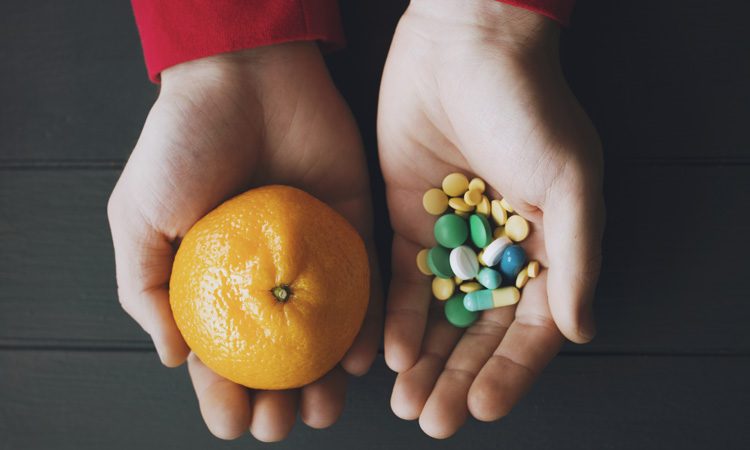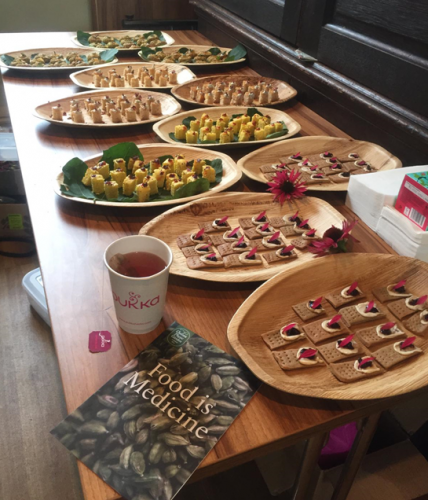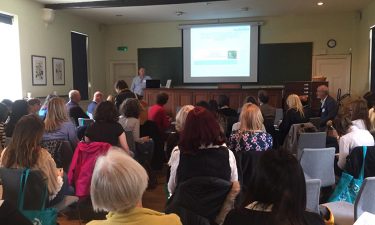Preventing antibiotic resistance through natural remedies
- Like
- Digg
- Del
- Tumblr
- VKontakte
- Buffer
- Love This
- Odnoklassniki
- Meneame
- Blogger
- Amazon
- Yahoo Mail
- Gmail
- AOL
- Newsvine
- HackerNews
- Evernote
- MySpace
- Mail.ru
- Viadeo
- Line
- Comments
- Yummly
- SMS
- Viber
- Telegram
- Subscribe
- Skype
- Facebook Messenger
- Kakao
- LiveJournal
- Yammer
- Edgar
- Fintel
- Mix
- Instapaper
- Copy Link
Posted: 8 October 2019 | Sam Mehmet (New Food) | 2 comments
New Food attended the Pukka Herb event ‘Before we really need antibiotics, what are the healthy alternatives?’ to discover how natural options might help secure the future of antibiotics.


The prescription of antibiotics has become a hot topic in the world of food and health. Research suggests that the excessive and often unnecessary prescription of antibiotics for minor infections such as sore throats, ear infections and UTIs, risks a future of multi-drug resistance to otherwise treatable illnesses.
It is predicted that by 2050, 10 million people will die due to antimicrobial resistance (AMR). In fact, taking one course of antibiotics can see a 30 percent reduction in effectiveness just three months on.
New Food recently attended a conference convened by Pukka Herbs, which examined alternatives for routine antibiotic prescription and pushed for a sea change to the over-prescribing culture that is driven as much by patient demand as it is by a perceived shortage of alternatives by GPs.
GPs at the event made clear that patients’ expectations and GPs’ knowledge base and short consultation windows are major reasons for the excessive use of antibiotics. For example, concerned and ill-informed parents who want a quick-fix for their child’s condition, coupled with GPs working under extreme pressures in overrun and busy clinics mean there isn’t the time to describe alternative options. That being said, it was also suggested that GPs are not medically trained in herbal medicine, nutrition or other non-pharmaceutical strategies that help develop immune resilience, so offering alternatives to antibiotics may be an issue of simply not knowing them.
Of course, there is also the on-going debate of the over-use of antibiotics in farm animals and pets, which experts say is transferring AMR to humans as well as distributing AMR genes into the environment.
Food as medicine?


Foods such as thyme, mushroom, garlic, sage, zinc, echinacea, elderberry and pelargonium are examples of home remedies with benefits against illnesses.
Food ingredients and nutrients such as thyme, mushrooms, ginger, garlic, sage, zinc, echinacea, elderberry, andrographis and pelargonium are examples of natural remedies that have been demonstrated to enhance immunity.
The Pukka event, held at the Chelsea Physic Garden in London, looked to provoke this discussion and aimed to bring together health and industry professionals to provide evidence of alternative remedies, their evidence base and success rates.
Key speakers from Pukka, universities, and GP clinics from across the UK, spoke about ongoing research, the predicament and pressures of GPs, as well as current and future strategies to regulate the world of natural remedies.
Euan MacLennan, a medical herbalist working in conjunction with NHS practices and also Pukka’s herbal director, explained that a survey was carried out to examine public knowledge of antibiotics. It revealed that 70 percent of participants believed antibiotics can cure cold and flu, and 52 percent believed they can kill viruses, which is simply not the case. Further to this, of the same participants, 80 percent were aware of the fact that the use of antibiotics results in reduction of resistance, yet were still happy to use antibiotics for these common illnesses.
The conference speakers emphasised a need for education as paramount to the future of antibiotics, and that we must, as a society, shift away from the notion of there being “a pill for every ill.”
The role of a healthy diet and appropriate lifestyles is considered key to reducing the risk of infectious diseases. The gut microbiome, the collective community of genomes from microorganisms in the gastrointestinal tract, is influenced massively by dietary intake. Short chain fatty acids are products of carbohydrate and amino acid fermentation and play a key role in interactions between the host and the microbiota and have widespread effects on gut and brain function, immunity and behaviour.
Polyphenols, a group of micronutrients we receive through certain plant-based foods, such as herbs, spices and berry fruits, can modulate the microbiota and promote the growth of beneficial bacteria, all at the expense of pathogenic bacteria. In turn, a healthy gut microbiome is essential to the proper modulation of the immune system and the prevention of a broad range of common infections and illnesses.
However, it does not stop at just being careful about what you eat. With products that already exist, regulation may confuse the consumer even further. Although certain EU initiatives, such as the Traditional Herbal Registration (THR) scheme have been developed to ensure the regulation of the quality of herbal medicinal products, available options targeting immunity are relatively few and far between. Additionally, many consumers are not swayed by certificates or marks on products. Instead, they often go for the cheapest option, which may be poor quality unregulated products sold via disreputable operators via the Internet.


Pukka Herbs event: Before we really need antibiotics, what are the healthy alternatives?
The perceived need for regulation has been driven by the worst case of irresponsible herbal medicine practice ever recorded, in a slimming clinic run by medical doctors just a stone’s throw from the European Parliament in Brussels back in 1990-91. This involved the erroneous substitution of Aristolochia fangchi (“guang fang ji”) and Stephania tetrandra (“hang fang ji”), both plant species being used in traditional Chinese medicine (TCM), albeit using very specific methods of preparation. Both are commonly called “fang ji” and have morphological similarities. However, A. fangchi, if prepared incorrectly as in the case of the Belgian clinic, contains high levels of aristolochic acid, a carcinogen that causes urothelial carcinoma as well as aristolochic acid nephropathy (AAN). In this case, its improper use led to over one hundred deaths or end-stage renal disease.
This extreme case needs to be seen in the context of an overwhelmingly safe history of use of the majority of food and plant-based remedies for enhancing immune function.
Accordingly, the experts gathered at the Chelsea Physic Garden are now working to collate available evidence for natural remedies that may be used safely to support immunity. The completed dossier will be submitted to Public Health England which is responsible for providing evidence-based guidance both for GPs and the public.
The shared aim is to ensure that information about evidence-based, non-pharmaceutical alternatives are readily available for self-care in order that effective antibiotics remain available when they are really needed.
Related topics
Clean Label, Health & Nutrition, Ingredients, Natural, Pathogens, Plant based, Regulation & Legislation, Research & development, The consumer










Garlic has been tested in studies comparing its effectiveness to common antibiotics and has been proven equally effective as Penicillin, Erythromycin Tetracyclines and more. It also has proven effectiveness against some resistant bacteria that no longer responds to prescription antibiotics. Garlic has been proven to be effective in stopping Candida yeast, herpes simplex, viruses causing the common colds and flus, and sinus infections! Fresh uncooked garlic has the most benefits as some of its medicinal properties can be lost in cooking. I often cook a meal and then add the chopped garlic afterwards. It can be quite powerful but it is soooo yummy!!! Be careful with large doses as it can cause a bit of stomach upset if you aren’t used to it.
Thank you for this helpful article on antibiotic resistance. It’s so important that the public understand the concept and how we can work to combat it with natural remedies. Keep up the good work!